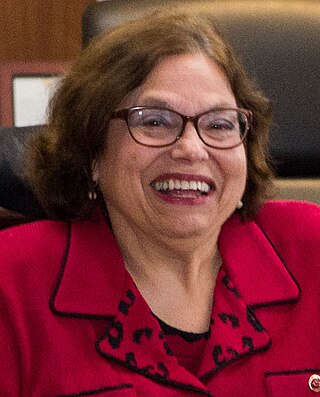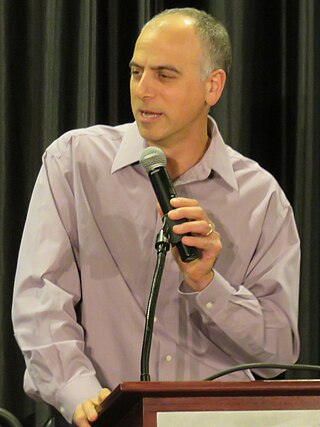Related Research Articles

Mina Shum is an independent Canadian filmmaker. She is a writer and director of award-winning feature films, numerous shorts and has created site specific installations and theatre. Her features, Double Happiness and Long Life, Happiness & Prosperity both premiered in the US at the Sundance Film Festival and Double Happiness won the Wolfgang Staudte Prize for Best First Feature at the Berlin Film Festival and the Audience Award at Torino. She was director resident at the Canadian Film Centre in Toronto. She was also a member of an alternative rock band called Playdoh Republic.

Doris Adelaide Derby was an American activist, documentary photographer, and director of Georgia State University's Office of African-American Student Services and Programs and adjunct associate professor of anthropology. She was active in the Mississippi civil rights movement, and her work discusses the themes of race and African-American identity. She was a working member of the Student Nonviolent Coordinating Committee (SNCC), as well as co-founder of the Free Southern Theater, and the founding director of the Office of African-American Student Services and Programs. Her photography has been exhibited internationally. Two of her photographs were published in Hands on the Freedom Plow: Personal Accounts by Women in SNCC, to which she also contributed an essay about her experiences in the Mississippi civil rights movement.

Judith Ellen "Judy" Heumann is an American disability rights activist. She is recognized internationally as a leader in the disability community. Heumann is a lifelong civil rights advocate for people with disabilities. Her work with governments and non governmental organizations (NGOs), non-profits, and various other disability interest groups, has produced significant contributions since the 1970s to the development of human rights legislation and policies benefiting children and adults with disabilities. Through her work in the World Bank and the State Department, Heumann led the mainstreaming of disability rights into international development. Her contributions extended the international reach of the independent living movement.
Bonnie Sherr Klein is a feminist filmmaker, author and disability rights activist.

Idil Ibrahim is a Somali-American independent film director, producer, actress, writer.

Intersex, in humans and other animals, describes variations in sex characteristics including chromosomes, gonads, sex hormones, or genitals that, according to the UN Office of the High Commissioner for Human Rights, "do not fit typical binary notions of male or female bodies". Intersex is a part of nature and that is reflected in some representations of intersex in film and other media.
Maria Rantho was a South African disability rights activist and politician. She was the first wheelchair user elected to the National Assembly of South Africa.

Dan Habib is an American documentary film director, producer, and cinematographer based in Concord, New Hampshire. His award-winning films on disability-related topics include Who Cares About Kelsey?, Including Samuel, Intelligent Lives, Restraint and Seclusion: Hear Our Stories, and several short documentaries. His films have been Emmy-nominated, translated into 17 languages, and used worldwide to support inclusive education and disability rights. Habib's most recent documentary short, My Disability Roadmap, is co-directed with his son Samuel Habib. The film made its world premiere at Hot Docs Canadian International Documentary Festival on May 1, 2022, and streamed as part of The New York Times Op-Docs series. The film consists of interviews between Samuel and prominent disability activists around the United States, and also shows some of the challenges that the Habibs experienced in traveling to those locations. The film also discusses Samuel's interest in dating as a disabled person.
Elle-Máijá Apiniskim Tailfeathers is a Blackfoot and Sámi filmmaker, actor, and producer from the Kainai First Nation in Canada. She has won several accolades for her film work, including multiple Canadian Screen Awards.

Ayoka ("Ayo") Chenzira is an independent African-American producer, Film director, television director, animator, writer, experimental filmmaker, and transmedia storyteller. She is the first African American woman animator and one of a handful of Black experimental filmmakers working since the late 1970s. She has earned international acclaim for her experimental, documentary, animation, and cross-genre filmmaking productions. Her work, as well as her efforts as one of the first African American woman film educators, have led some in the press to describe her as a media activist for social justice and challenging stereotype representations of African Americans in the mainstream media.

Beverley Palesa Ditsie is a South African lesbian activist, artist, and filmmaker. Ditsie is one of the founders of the gay rights organization Gay and Lesbian Organization of Witwatersrand.
Joanne Hershfield is an author, filmmaker, and professor. Her expertise includes gender, feminism, and film in the United States and Mexico.
Jeeja Ghosh is an Indian disability rights activist. She was born with cerebral palsy.

Shalini Kantayya is an American filmmaker and environmental activist based in Brooklyn, New York, whose films explore human rights at the intersection of water, food, and renewable energy. Kantayya is best known for her debut feature documentary, Catching the Sun.
Suwi is a 2010 Zambian film written and directed by Musola Cathrine Kaseketi and co-directed by Sandie Banda.
Pascale Lamche, is a French–South African filmmaker. She is known as the director of several critically acclaimed film including Stalingrad, Black Diamond, Pakistan Zindabad, French Beauty, Accused #1: Nelson Mandela, Sophiatown and Winnie. Apart from filmmaking, she is also a producer, writer and cinematographer.
Jang Hye-young is a South Korean politician and human rights activist for the disabled. She is an incumbent lawmaker and has proposed anti-discrimination laws. Jang's fight for rights for the disabled means a lot to her on the personal level, as she has an autistic sister. In 2018, she released a documentary about their shared life together. This award-winning documentary gained her recognition as a disability rights activist and filmmaker. Jang is a member of the Progressive Justice Party of Korea.
Edith Prentiss was an American disability rights activist.
Abha Khetarpal is an Indian disability rights activist and counsellor based in New Delhi, India. She is the founder of Cross The Hurdles – a counselling/educational resource website and mobile application designed for people with disabilities.
References
- ↑ Edine, Nicole (25 March 2014). "9 Women Who Are Taking The Lead In Places Where Men Rule". Huffington Post. Retrieved 11 March 2015.
- 1 2 3 4 Warnke, Melissa Bachelor. "A Lifetime of Art: Musola Cathrine Kaseketi". The Daily Beast. Retrieved 11 March 2015.
- 1 2 3 4 5 6 Mwizabe, Gethsemane (4 September 2014). "Catherine Musola Kaseketi: Agile Filmmaker, Human Rights Activist". Times of Zambia. Retrieved 11 March 2015.